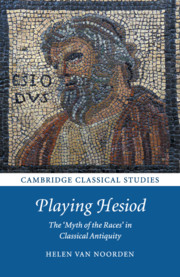
-
Select format
-
- Publisher:
- Cambridge University Press
- Publication date:
- December 2014
- December 2014
- ISBN:
- 9781139019347
- 9780521760812
- 9781108730020
- Dimensions:
- (216 x 138 mm)
- Weight & Pages:
- 0.62kg, 360 Pages
- Dimensions:
- (216 x 140 mm)
- Weight & Pages:
- 0.4kg, 362 Pages
Book description
This book offers a new description of the significance of Hesiod's 'myth of the races' for ancient Greek and Roman authors, showing how the most detailed responses to this story go far beyond nostalgia for a lost 'Golden' age or hope of its return. Through a series of close readings, it argues that key authors from Plato to Juvenal rewrite the story to reconstruct 'Hesiod' more broadly as predecessor in forming their own intellectual and rhetorical projects; disciplines such as philosophy, didactic poetry and satire all engage in implicit questions about 'Hesiodic' teaching. The first chapter introduces key issues; the second re-evaluates the account in Hesiod's Works and Days. A major chapter outlines Plato's use of Hesiod through close study of the Protagoras, Republic and Statesman. Subsequent chapters focus on Aratus' Phaenomena and Ovid's Metamorphoses; the final chapter, on the Octavia attributed to Seneca and Juvenal's sixth Satire, broadens ideas of Hesiod's reception in Rome.
Contents
Metrics
Altmetric attention score
Full text views
Full text views help Loading metrics...
Loading metrics...
* Views captured on Cambridge Core between #date#. This data will be updated every 24 hours.
Usage data cannot currently be displayed.
Accessibility standard: Unknown
Why this information is here
This section outlines the accessibility features of this content - including support for screen readers, full keyboard navigation and high-contrast display options. This may not be relevant for you.
Accessibility Information
Accessibility compliance for the PDF of this book is currently unknown and may be updated in the future.


